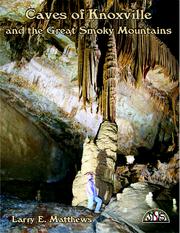Buy this book

This book describes fourteen (14) caves located in the vicinity of Knoxville to Bristol that are either currently open to the public or have been open to the public at some point in the past.
The history of each cave is documented from the earliest human use, which may have been by prehistoric peoples in some caves, through the initial settlement in the 1700s, through the mining of saltpeter during the War of 1812 and the Civil War, through the commercial development of the cave. The book is profusely illustrated with maps, photographs, and commercial brochures and postcards.
Buy this book

Subjects
caves, Tennessee caves, Thomas Jefferson, Daniel BoonePeople
Thomas Jefferson, Daniel BooneTimes
1750-2008| Edition | Availability |
|---|---|
|
1
Caves of Knoxville and the Great Smoky Mountains
June 2008, National Speleological Society
Paperback
|
aaaa
|
Book Details
First Sentence
"With over 10 million visitors coming every year, Great Smoky Mountains National Park is the most visited National Park in the United States."
Table of Contents
Edition Notes
This book contains a Glossary and a very complete Index.
The Physical Object
ID Numbers
Work Description
This book describes fourteen (14) caves in East Tennesse that are either currently open to the public as commercial caves or were open to the public at some time in the past. This historical account begins with the discovery of Gap Cave, in Cumberland Gap, by Dr. Thomas Walker on April 13, 1750. Walker was the personal physician of Thomas Jeffereson's father and was Jefferson's guardian after his death. Daniel Boone visited thi cave in1775. Gap Cave is currently open to the public and is inside Cumberland Gap National Park. The other thirteen caves also have fascinating histories.
Community Reviews (0)
Feedback?| June 17, 2010 | Edited by 74.179.16.66 | Added additional information. |
| April 28, 2010 | Edited by Open Library Bot | Linked existing covers to the work. |
| December 10, 2009 | Created by WorkBot | add works page |









